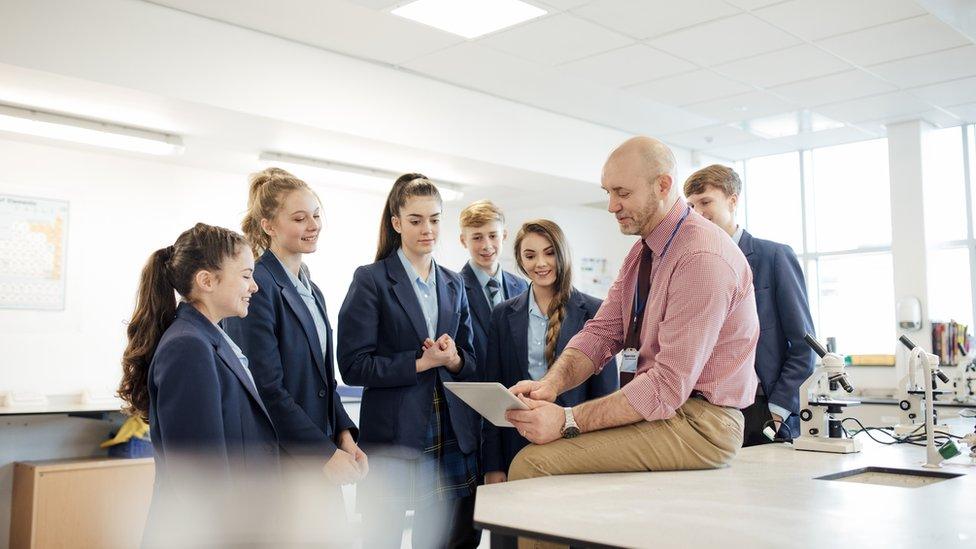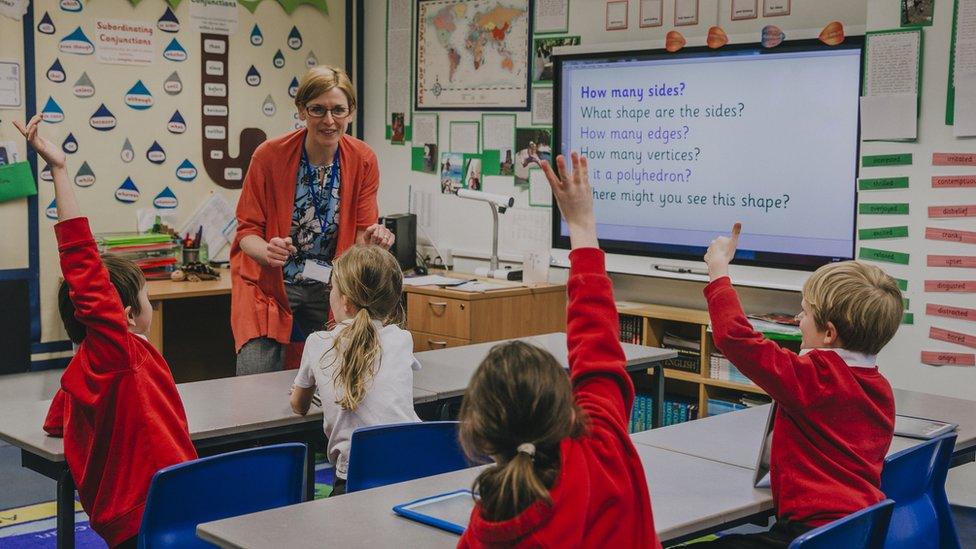Ofsted cuts leave parents guessing, say MPs
- Published

Parents in England are not getting the assurance they need about the quality of education their children are receiving, a committee of MPs warns.
It is unacceptable that so many schools - previously rated outstanding by education watchdog Ofsted - are exempt from being reinspected, the Public Accounts Committee (PAC) says.
PAC says cuts to Ofsted's budget mean families cannot make informed choices.
Ofsted says it is confident inspections offer parents the assurance they need.
Ofsted's chief inspector, Amanda Spielman, said it was maintaining "excellent levels of assurance" despite its budget being more than halved.
"One might think that a parliamentary committee that was responsible for public money would be pleased that we had put so much effort into staying within our means. It would certainly be the first to roast us if we didn't," she said.
What does the report say?
The PAC report highlights a number of concerns, saying:
it is "unacceptable" that so many schools are exempt from being reinspected and so have not been inspected for six years or more
short inspections do not allow inspectors enough time to make a "meaningful assessment" of a school's performance or help schools improve
inspectors do not give parents enough opportunity to contribute their views about the school
the system for school accountability and improvement is muddled, leading to confusion for schools and parents
the watchdog has struggled to employ enough inspectors, so has failed to complete its inspection programme
Ofsted is not enough of a "force for school improvement"
The committee acknowledges funding issues.
"We recognise that Ofsted's budget has been cut significantly in recent years, and the amount it spent on inspecting the schools sector fell by 52% in real terms between 1999-2000 and 2017-18.
"However, this has led Ofsted and the Department for Education to focus narrowly on the cost of inspection, rather the value of getting independent assurance about schools' effectiveness."
The report also criticises the watchdog for incorrectly stating in its annual report for 2016-17 that it had met the statutory target for reinspecting schools every five years, when it had actually failed to do this for 43 schools.
Why aren't all schools inspected?
Under legislation, schools that Ofsted has previously rated as outstanding are exempt from routine reinspections - unless the watchdog identifies a particular risk.
As at August 2017, 1,620 schools had not been inspected for six years or more, including 296 schools that had not been inspected for 10 years or more.
The PAC report says: "As a result, some pupils go through the whole of primary and/or secondary school without any independent assessment of their school's effectiveness."
Earlier this year, the National Audit Office warned that Ofsted's "effectiveness has reduced" as a result of the decision by the Department for Education and the watchdog to end routine inspections for these schools.
What does the committee chair say?
Meg Hillier, the committee's chairwoman, said: "Cuts to Ofsted's budget have undermined families' ability to make informed decisions about schools.

"If the level of inspection continues to be eroded there is a risk that Ofsted will come to be perceived by parents, Parliament and taxpayers as not relevant or worse, simply a fig leaf for government failures on school standards.
"Should this happen, its credibility will evaporate."
How has Ofsted responded?
Ofsted's chief inspector Ms Spielman, said: "As with all of the public sector, we have had to do more with less.
"However, I remain confident that our inspections provide parents, schools and the government with the assurance they need about school standards and that we do so in a way that compares very favourably in terms of quality and value for money with school inspection regimes internationally," she told BBC Radio 4's Today programme.
"However, we have reached the limit in terms of being able to provide that level of assurance within our current funding envelope.
"That is why, with our ongoing framework review, we are looking at how to ensure that schools and parents get everything they need from our reports, and why many of the committee's recommendations are already long in train."
Ms Spielman added that she would continue to speak out on issues in the sector, such as the dangers of illegal unregistered schools, the risks of radicalisation, the narrowing of the curriculum and the importance of early literacy.

- Published24 May 2018
